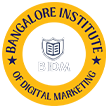
When students pass their 12th grade (senior secondary), one of the most common questions they—and their parents—ask is: “What next?” Many feel pressure to choose a “safe” or “prestigious” field: engineering, medicine, business, or computer science.
But the world is changing fast, and digital skills are now among the most valuable competencies to have.
Digital marketing is one of those fields where, yes — you can absolutely start learning right after 12th.
In fact, for many learners, starting early gives a head start in building practical experience, earning opportunities, and career growth.
In this in-depth article, we will explore:
Table of Contents
Let’s dive in.
Why Digital Marketing Is a Good Option After 12th
The Rise of Digital Economy
The digital transformation of businesses is no longer optional. Whether you run a local shop or a big enterprise, you need to be online. I
ndia, for example, is witnessing a massive growth in internet users, increasing adoption of e-commerce, and digital-first advertising strategies.
Many companies now allocate significant portions of their marketing budgets to digital channels.
According to industry reports, the digital marketing industry is projected to grow rapidly in the coming years.
This in turn increases demand for skilled professionals who can manage SEO, social media, PPC, content, analytics, etc.
Less Barrier to Entry
One of the big advantages of digital marketing is that it’s largely skill-based.
Unlike fields that require very heavy prerequisites (e.g. advanced math, deep physics, etc.), digital marketing can be learned progressively.
Many institutes and platforms offer entry-level courses that do not require a prior degree. They may ask for basic computer skills and ability to learn.
Multiple sources confirm this: many digital marketing courses are open to 12th-pass students.
Early Start = More Time for Experience
If you begin your digital marketing learning and practice right after 12th, you get a few years of practical experience even before going for a degree or another course.
That experience can significantly enhance your resume, help you land freelance projects, internships, or full-time roles earlier, and allow you to build a portfolio.
Versatility & Hybrid Options
Digital marketing is a versatile skill. Even if you later decide to do a degree in BBA, Marketing, or Computer Applications, your digital marketing knowledge complements many other domains.
You might end up in roles such as brand manager, digital strategist, content creator, SEO specialist, analytics, advertising, social media, or running your own ventures.
Cost and Time Efficiency
Compared to many traditional degree programs, high-quality digital marketing courses can be shorter (few months to a year) and more affordable. Some are online, have flexible schedules, and often come with placement support.
In summary: starting after 12th gives you an edge, practical experience, and flexibility to pivot later.
What Is a Digital Marketing Course?
Before exploring course types, it’s important to define what digital marketing as a discipline includes, and what a digital marketing course aims to teach.
What Is Digital Marketing?
Digital marketing refers to the practice of promoting products, services, or brands using online channels and digital technologies. It encompasses many subdomains, including:
- Search Engine Optimization (SEO)
- Search Engine Marketing / Paid Ads (SEM / PPC)
- Social Media Marketing (SMM)
- Content Marketing
- Email Marketing
- Affiliate Marketing
- Influencer Marketing
- Mobile Marketing
- Web Analytics (Google Analytics, etc.)
- Display Advertising, Banner Ads
- Video Marketing, YouTube
- Marketing Automation
- Conversion Rate Optimization (CRO)
- Growth Hacking strategies
A good course will cover foundational theory plus hands-on practice in many of these areas.
What Does a Digital Marketing Course Include?
A course typically includes:
- Lectures (live or recorded)
- Assignments and quizzes
- Projects & case studies
- Tools training (Google Analytics, Ads, Meta Ads, SEO tools etc.)
- Internships or live campaigns (depending on institute)
- Mentorship, doubt-clearing sessions
- Certification
Depending on the level (beginner, intermediate, advanced), it may go deep into specialized areas.
Eligibility: Can i do a Digital Marketing Course After 12th?

Yes, you often can. Let’s look more closely at how eligibility works and possible constraints.
Basic Eligibility in Many Institutes
Most digital marketing courses (certificate or foundational levels) do not require you to have a bachelor’s degree. Passing 12th (or equivalent) is usually enough, along with basic computer literacy (typing, internet usage). Some might even accept those still in 12th, though you’ll need confirmation.
Multiple sources agree: many digital marketing courses are open to students who have completed 12th.
Advanced or Specialized Programs
For higher-level programs — e.g. postgraduate diplomas, advanced analytics courses, or executive certifications — some institutes might prefer or require a bachelor’s degree or work experience. Always check each program’s eligibility criteria.
Degree Options with Digital Marketing
If you want a more formal degree, many universities now offer undergraduate programs in Management, Business Administration, or even specialized degrees in Digital Marketing. After 12th, you may enroll in:
- BBA (Digital Marketing or Marketing)
- BA / BCom with specialization in digital marketing modules
- B.Sc in Digital Marketing
- Integrated or Honors programs
These degrees combine business, marketing, and digital subjects. For instance, a BBA in Digital Marketing is marketed as a 3-year undergraduate degree blending management fundamentals with digital marketing knowledge.
Thus, your options after 12th include both standalone digital marketing certification/diploma courses and degree-level programs.
Types of Digital Marketing Courses You Can Do After 12th
When exploring courses, you will find multiple formats. Below are common types and what to expect in each.
Short Certificate Courses / Bootcamps
- Duration: from few weeks to 3–4 months
- Focus: foundational or intermediate level
- Content: basics of SEO, PPC, social media, content, analytics
- Mode: online, live or self-paced
- Ideal for: those wanting a quick skill boost
Several platforms (Coursera, UpGrad, etc.) offer digital marketing certifications.
Diploma / Advanced Diploma Courses
- Duration: typically 6 to 12 months
- Coverage: more modules, deeper learning, case studies, projects
- Mode: online, hybrid, or classroom
- Added value: internships or live campaigns
- Example: Institute of Internet and Software Development (IISDT) offers a diploma program in digital marketing.
Degree / Undergraduate Courses
- Duration: 3 years (in India)
- Degree: BBA, BA, BSc, etc. with focus on digital marketing
- Curriculum: covers business, marketing, management, plus digital components
- Advantage: recognized degree, broader learning base
Specialized Programs & Certifications
- Some courses focus solely on SEO/SEM, analytics, or content marketing.
- Certificates from credible bodies (Google, Meta, HubSpot) add to resume value.
- Many programs now incorporate generative AI, growth marketing, or niche digital domains.
Free & Beginner-Level Courses
To test waters or build foundational knowledge, you can opt for free courses offered by platforms such as:
- HubSpot Academy
- Semrush SEO crash courses
- Great Learning – Introduction to Digital Marketing
- Coursera free trials or financial aid options
Starting with free courses helps you assess interest before investing.
What Skills Will You Learn in a Digital Marketing Course?
Here’s a breakdown of critical skills and topics you are likely to learn (graded from basic to advanced):
Foundational Modules
- Introduction to Digital Marketing
- Marketing Fundamentals & 4Ps in digital context
- Understanding the digital customer journey
- Market research in digital era
Core Digital Modules
- Search Engine Optimization (SEO): On-page, Off-page, technical SEO
- Search Engine Marketing (SEM) / Google Ads / PPC
- Social Media Marketing: Facebook, Instagram, LinkedIn, Twitter, TikTok
- Content Marketing: Content strategy, blogging, content calendars
- Email Marketing & Automation
- Web Analytics & Google Analytics
- Display Advertising & Programmatic Ads
- Video Marketing & YouTube
- Affiliate Marketing
- Inbound Marketing
- Marketing funnel, conversion optimization (CRO)
- Mobile Marketing & App marketing
- Influencer Marketing
- Campaign Planning & Budgeting
Practical / Hands-on Skills
- Running live campaigns
- Tool usage: SEMrush, Ahrefs, Google Ads, Facebook Business Manager, etc.
- Data interpretation & reporting
- A/B testing
- Using marketing dashboards
- Writing ad copies, landing pages
- Reporting & dashboards for stakeholders
Soft Skills & Strategic Thinking
- Communication & copywriting
- Creative thinking
- Analytical mindset
- Adaptability to trends
- Networking & collaboration
- Understanding privacy, ethics, compliance
A well-designed course will balance theory, tool training, and real-world practice.
Top Courses & Institutes (India & Online) That Accept 12th Students
Here are notable courses and institutes that you can consider (as of 2025). Always check the most current eligibility, syllabus, fees, and student reviews.
Indian Institutes / Offline & Hybrid Options
Bidmonline (Bangalore institute of Digital Marketing) is one of the best training centre & institute for learning digital marketing.
How to Pick the Right One for You
When choosing, consider:
- Curriculum relevance & depth
- Hands-on projects or live campaigns
- Tools and tool access
- Mentorship and doubt support
- Internship or placement support
- Reviews, alumni outcomes
- Flexibility (online vs offline)
- Fee structure & payment plans
How to Evaluate a Good Digital Marketing Course: What to Look For
Choosing the right course is crucial. Here are criteria tied to the quality and credibility
Curriculum Coverage & Updates
- Is the syllabus current (AI, algorithm updates, short-form video, etc.)?
- Does it cover both theory and practice?
- Are tools (Google Analytics, Meta, SEO tools) included?
- Are there case studies or live campaigns?
Instructor Expertise & Visibility
- Who are the instructors? What is their background?
- Do they have experience in running real campaigns or working in agencies?
- Can you see their credentials (LinkedIn, personal site)?
Showing author/instructor authority is part of building trust signals.
Practical Exposure & Portfolio Development
- Does the course include hands-on assignments or live projects?
- Will you get to run actual campaigns?
- Will you build a portfolio you can show to employers?
Practical evidence of skills is more valuable than just theoretical certificates.
Internship & Placement Assistance
- Are internships facilitated?
- Does the institute help with job placement or connect with agencies?
- What do alumni say about outcomes?
Community & Mentorship
- Is there a community of learners (forums, groups)?
- Can you ask questions and get feedback?
- Are mentors available?
Certification & Recognition
- Is the certificate recognized (industry, hiring agencies)?
- Do they partner with known brands or institutions?
Reviews, Testimonials & Alumni
- Read student reviews carefully (not only the ones shown on their own site).
- Check for evidence of student success: job placements, freelancing, growth.
Cost vs Return & Payment Plans
- Does the cost make sense for your budget?
- Are EMI or installment options available?
- What is the return (job, income growth) expected?
Support, Updates, Lifetime Access
- Will you get updates (as algorithms change)?
- Can you access course materials later?
If a course meets most of these, it’s more likely to help you succeed.
Career Paths, Job Roles, Growth & Salary
After completing a digital marketing course (or degree), there are many paths and roles you can pursue. Let’s look at common roles, how to grow, and salary expectations.
Common Job Roles
- SEO Executive / SEO Specialist
- PPC / SEM Specialist
- Social Media Manager
- Content Strategist / Content Marketer
- Email Marketing Specialist
- Digital Marketing Manager
- Analytics / Data-Driven Marketer
- Influencer / Community Manager
- Affiliate / Performance Marketing Manager
- Growth Marketer / Growth Hacker
- Freelance Digital Marketer
- Agency roles
- In-house roles in marketing teams
Growth Trajectory
You’ll often start in an entry-level role (executive / junior). Over time you can move to specialist or managerial positions, or lead marketing strategy for brands or clients. Those with multiple skills (SEO + SEM + analytics + creativity) tend to progress faster.
You might also run your own freelance business or digital marketing agency.
Salary / Earnings
Salaries vary by country, city, experience, and specialization. In India:
- Entry / fresher digital marketing professionals often earn in the range of ₹2.5 lakhs to ₹5 lakhs per annum (or more in metros).
- Mid-level (2–5 years) roles may command ₹5–10 lakhs or above.
- Specialized roles (Analytics, Growth) or managerial roles often exceed ₹10 lakhs.
- Freelancers or consultants often charge per project or retainer and in many cases can earn more depending on clients.
Some reports mention that digital marketing professionals in India earn average salaries from ₹3 lakhs to ₹10.9 lakhs annually, depending on experience and domain.
Check out our blog for Digital Marketing Salary Expectations
Other Earning Options
- Freelancing / contract projects
- Affiliate marketing / passive income
- Running your own online business, startups
- Consulting & advising
- Teaching or training others
Because digital marketing skills apply broadly, you have many avenues to monetize your expertise.
Steps You Should Take After 12th (Roadmap)
Here is a suggested roadmap for someone who just passed 12th and wants to build a digital marketing career.
Step 1: Self-Learn & Explore
- Take free courses (e.g. HubSpot, Google Digital Garage, Great Learning)
- Read blogs, watch YouTube tutorials
- Try small experiments: run a blog, promote posts, try SEO or social media for a small project
Step 2: Choose a Course & Enroll
Based on evaluation criteria above, select a course or diploma program. Begin structured learning and commit time weekly.
Step 3: Hands-On Practice & Projects
- Work on assignments in your course
- Start your own blog or niche site
- Volunteer to help small businesses or NGOs with digital presence
- Practice ad campaigns (even with small budgets)
These early projects help you build a portfolio.
Step 4: Build Portfolio & Case Studies
- Document what you did, results achieved
- Show before/after metrics, screenshots, improvements
- Create a website or PDF portfolio
Step 5: Intern or Freelance
- Seek internships that allow you to apply skills
- Take small freelance gigs (e.g. social media for a local shop)
- Use platforms like Upwork, Fiverr, or local networks
Step 6: Network & Personal Branding
- Use LinkedIn to share digital marketing insights
- Write blog posts, guest blogs
- Attend webinars, meetups
- Engage in relevant communities
This builds your authority and credibility (E-E-A-T signals).
Step 7: Upskill & Specialize
- After basics, choose a specialization (SEO, analytics, content, growth)
- Take advanced courses or certifications
- Stay updated with algorithm changes, new tools, AI, trends
Step 8: Apply & Grow
- Apply for full-time roles
- Keep optimizing your profile, portfolio
- Track metrics to show impact
- Negotiate, switch roles or companies as you grow
By following this roadmap, you maximize the early start opportunity.
Challenges You May Face & How to Overcome Them
It’s important to be prepared. Below are common obstacles and how to handle them.
Lack of Guidance & Mentorship
Solution: Choose courses with strong support and mentorship. Join communities and network with professionals. Seek mentors via LinkedIn or local meetups.
Overwhelming Tool / Information Overload
Digital marketing has many tools and constant updates. It’s easy to get overwhelmed.
Solution: Start with core tools. Learn one tool thoroughly. Use the Pareto principle (focus on 20% tools giving 80% results). Stay consistent.
Fear of Not Having a “Traditional Degree”
Some employers may prefer degree holders, especially initially. But if your portfolio, internships, and results speak, you can compete.
Solution: Combine your digital marketing course with an undergraduate degree if you like. Or focus on freelancing and results to showcase capability.
Competition & Saturation
Many people are entering digital marketing. Differentiation is key.
Solution: Focus on niche areas, build unique strengths, specialize, or combine digital marketing with domain expertise (e.g. healthcare, education).
Algorithm Changes & Keeping Up
Digital marketing is dynamic, with algorithm changes in Google, social platforms, etc.
Solution: Stay updated via blogs, newsletters, forums. Be adaptable. Adopt continuous learning mindset.
Budget Constraints
Some good courses can be expensive.
Solution: Use free resources initially, then invest once you see results. Look for scholarships, EMI options, and local training centers with good reputations.
FAQs (Frequently Asked Questions)
Is a degree mandatory to become a digital marketer?
No. Many practitioners begin with certificate or diploma courses and build portfolios. A degree can help in certain roles, but what matters most is skill, results, and experience.
How long does it take to become job-ready?
With focused effort and the right course, you can get ready in 6–12 months (with practice, projects). But mastery grows over years.
Which area should I specialize in?
You can start broadly, then pick a specialization like SEO, analytics, content, growth marketing, etc. Choose what interests you and where you see demand.
Will companies hire 12th-passers?
Some companies prefer degree holders, but many startups, agencies, and small firms focus more on skill, portfolio, and results. Your early freelancing or internship work helps.
How much budget do I need to start?
You can begin with free tools (e.g. basic Google Ads credits, free SEO tools). A modest budget (a few thousand rupees) helps run small campaigns and test learning.
Do I need coding knowledge?
Not necessarily. Basic HTML/CSS is useful but many digital marketers succeed without deep coding. If you are curious, you can always learn later.
Can I do digital marketing and a degree simultaneously?
Yes. Many students enroll in a degree (BBA, BA, etc.) and simultaneously take a digital marketing course or freelance, giving you the benefit of both.
Conclusion & Action Steps
Yes — you absolutely can do a digital marketing course after 12th. In fact, starting early gives you a significant advantage. Because digital marketing is skill-based, it rewards demonstrable ability more than credentials alone.
If you’re motivated, here’s what you should do:
- Take a free introductory course to test your interest
- Choose a well-reviewed, supported digital marketing course or diploma
- Practice consistently and build a portfolio
- Seek internships or freelance work
- Keep learning, specialize, and stay updated
- Leverage your early experience to apply for roles or clients



